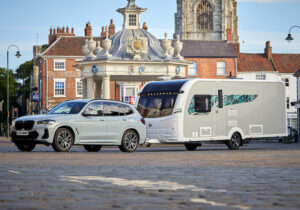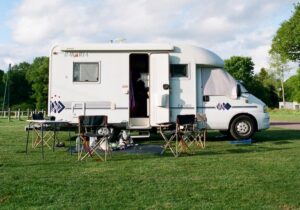By William Coleman
Leisure vehicle insurance is something that should never be overlooked and can end up saving you an absolute fortune. While leisure vehicles are taking a winter break, we spoke to CaravanGuard about the importance of all-year-round cover.
At this time of year, we are usually gearing up for our week-long stay at the Birmingham NEC show, where we get some face time with a lot of industry folk to find out what they have in store for 2021. Due to the pandemic, the February show had to be cancelled, but we are not letting that stop us from getting the key info from industry leaders like Neil Menzies, Caravan Guard’s director of relations.
CaravanTimes: For those who don’t know, who are Caravan Guard?
Neil: We’re a family-run business specialising in caravan, motorhome and trailer tent insurance. We have a close-knit team of 120 staff who would usually be working together in our Halifax HQ. Caravan Guard was born as part of a well-established insurance broker in 1995. Twenty-six years later, we have more than 100,000 customers, strong relationships with several hundred dealerships, manufacturers and converters across the UK, as well as an established presence at the NEC industry shows.
We believe we offer a great package of first-class service, value for money and extensive cover. Our policies are underwritten by well-known insurer RSA (formerly Royal & Sun Alliance Insurance plc).
The proof of the pudding, of course, is in the eating, so we’re proud the average satisfaction rating given by claimants is 9.1/10.
CaravanTimes: Last year the motorhome and caravan world saw a lot of first-time buyers. What advice would you give these newcomers when it comes to insuring their vehicle?
Neil: When insuring a leisure vehicle for the first time your dealership might work with an insurance specialist so it’s worth speaking to them. Look for a specialist in leisure vehicle insurance, like Caravan Guard, as they’ll be able to guide you through the quote process and how you can make some insurance savings.
We realise a lot of people will look for the cheapest caravan or motorhome insurance, but it’s important to make sure you check and compare the levels of cover so it meets your needs and that common risks, such as awning storm damage, are covered. Also, check the credentials of the insurance policy’s underwriter.
Finally, we’d suggest checking out customer review sites like Trustpilot to see what other owners think about an insurance company’s customer service and claims handling.
CaravanTimes: This may seem like an obvious one, but what are the advantages of having your vehicle insured?
Neil: It’s all about peace of mind, so if your caravan or motorhome is stolen or damaged in any way, owners will be put back in the same position they were in before something bad happened to their pride and joy. After all, many owners have invested many thousands of pounds in their leisure vehicle and if something bad were to happen, they don’t want to be left out of pocket.
Insuring your ‘van with ‘new-for-old’ cover also means that if it was written off or stolen and not recovered, you would be insured to buy a brand-new replacement or the nearest equivalent. Accidents can and do happen, even when your van is out of use.
From minor bumps and scrapes to significant storm damage to panels, road accidents and even fire or theft, make sure your leisure vehicle is adequately insured, should the worst happen.
CaravanTimes: How does leisure vehicle insurance differ from regular car insurance?
Neil: Unlike car and motorhome insurance, caravanners are not legally required to have caravan insurance. Specialist leisure vehicle insurance not only includes cover for the obvious things like theft, fire and damage caused on the road, but it provides cover for the equipment used by a caravan owner, such as awnings, motor movers, barbecues, solar panels and furniture, as well as accidental damage to fixtures and fittings inside the caravan, such as shower trays, worktops and seating.
Over the years, we’ve dealt with claims caused by a cow falling off a cliff, birds flying into caravans and a hungry horse!
Motorhome insurance is very similar to car or van insurance, but again, the main difference is that specialist cover is provided for the motorhome’s equipment inside the vehicle, as well as £5,000 of equipment cover for portable things that are taken on holidays.
Both policies give the option to take cover for emergency accommodations or ‘van hire, so you can continue on your holiday should disaster strike, as well as cover for travel in Europe. Our motorhome policy also includes UK roadside assistance cover as standard.
CaravanTimes: A lot of people think they do not need to keep their van insured during the offseason. This is a major mistake, right?
Neil: It might be tempting to cancel caravan insurance cover in the winter months, or even lockdown, if your ‘van is going to be laid up, to try to save a few pounds. Many common claims still do happen during the offseason, particularly weather or theft-related incidents. Leisure vehicles are often left unchecked in storage over the winter months with owners not finding damage until they return in the spring.
When we looked back at our caravan insurance claims from November 2019 to the end of February 2020, 43 per cent of claims payouts in the run-up to the first UK lockdown were when leisure vehicles were not in use, highlighting the importance of caravan insurance all-year-round.
The main risks facing a tourer over winter are accidental damage, stormy weather or theft-related incidents, whether that be caravan theft, attempted theft or thieves breaking into caravans to steal their contents. Also, not forgetting claims for damage caused by freezing weather conditions.
CaravanTimes: What type of different insurances do you provide?
Neil: We provide touring caravan, campervan, motorhome, trailer tent and fifth wheeler cover. We do offer, static caravan, chalet, holiday lodge, holiday home and park home insurance under our other brand Leisuredays.
CaravanTimes: Lastly, what is the most common type of claim Caravan Guard faces, we’d hazard a guess its theft?
Neil: Although motorhome and caravan theft are unfortunately on the increase, our most common claim in the last 12 months was damage related. Each year we deal with all kinds of claims for damage caused by manoeuvring mishaps, cracks and chips to windscreens and windows, falling tree branches and even cracked shower trays or spilt wine.
Claims trends differ from year to year and are often influenced by major weather events. For 2020, the most common claims were accidental damage, storm damage and theft.




